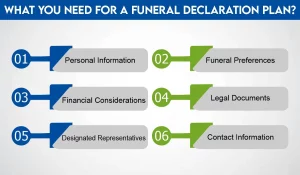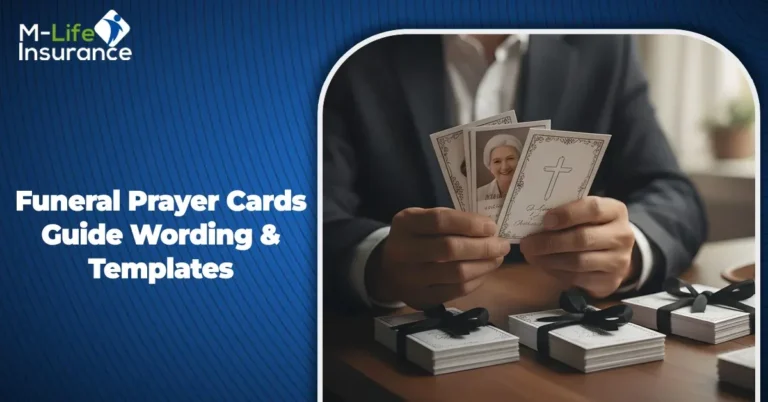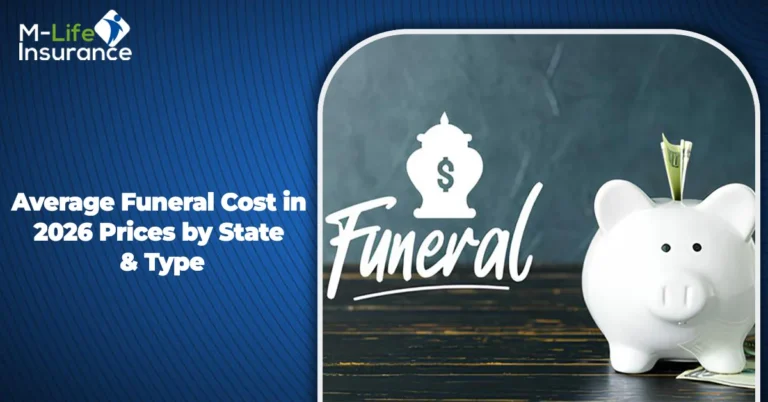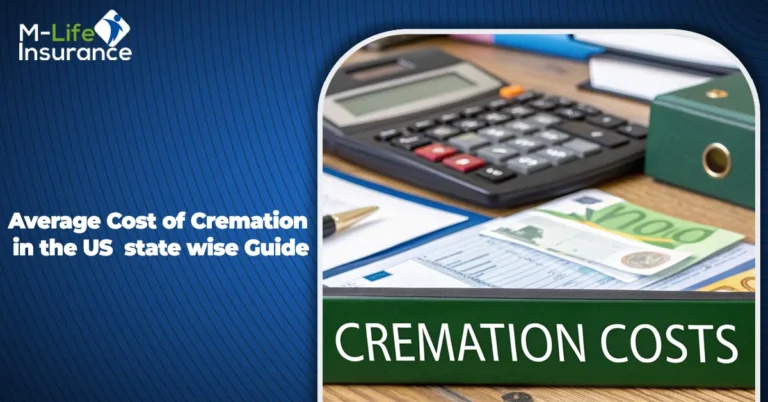Ever thought about planning your final celebration, your way? A funeral declaration plan isn’t about dwelling on the future’s uncertainties; it’s about creating a blueprint for a farewell that truly represents you. It’s a way to ease the burden on your loved ones during a difficult time by leaving behind clear instructions for your funeral wishes.
Crafting this plan is like leaving a guidebook, ensuring your last chapter aligns with your values and desires. Whether you prefer a serene ceremony in a favorite spot or a lively gathering reflecting your vibrant spirit, your choices matter. This guide isn’t about the end; it’s about giving you the ease to leave a meaningful tribute, reflecting the life you lived and the love you shared.
Let’s explore funeral planning declarations together!

What Is A Funeral Declaration Plan?
A Funeral Declaration Plan is a personalized document that outlines an individual’s specific wishes and instructions for their funeral and end-of-life arrangements. It serves as a comprehensive guide for family members, loved ones, or appointed representatives, ensuring that the person’s preferences are honored after their passing. This plan typically includes details such as whether the individual prefers burial or cremation, the type of funeral service or ceremony desired, specific requests for music, readings, or rituals, and any other preferences they may have regarding their final arrangements. Essentially, a Funeral planning declaration is a proactive way for individuals to assert control over their posthumous affairs, easing the decision-making process for their family and ensuring that their farewell aligns with their values, beliefs, and personal wishes.Who Can Make a Funeral Declaration Plan?
Any individual who is of legal age and possesses the mental capacity to make decisions can create a Funeral Planning Declaration. This includes adults who are in sound mental health and have the capability to express their preferences regarding their end-of-life arrangements. Whether young or old, healthy or facing health challenges, anyone can plan their funeral and end-of-life wishes. It’s a beneficial practice for individuals who wish to alleviate the burden on their loved ones during a difficult time and ensure that their final wishes are respected and carried out as desired. Creating a Funeral Plan isn’t limited by age, health status, or any other factor. It’s a proactive step that anyone can take to provide clarity and guidance to their family members or appointed representatives when making decisions regarding their funeral arrangements.Do You Need a Funeral Declaration Plan?
While having a Funeral Planning Declaration isn’t a legal requirement, it can be incredibly beneficial for many reasons. Planning for one’s funeral and end-of-life arrangements isn’t just about preparing for the inevitable; it’s a thoughtful way to ensure that your preferences are honored and to ease the burden on your loved ones during a challenging time. Here are a few reasons why having a this plan is advisable:1- Expressing Your Wishes
It allows you to clearly outline how you want your funeral to be conducted, including details such as burial or cremation preferences, type of service, location, music, readings, and more.2- Relieving Loved Ones
Your plan can alleviate stress for your family members by removing the uncertainty of decision-making during an emotional period.3- Personalization
It ensures that your final arrangements reflect your beliefs, values, and individuality.4- Financial Preparation
Planning in advance can help in budgeting and financial preparations for your funeral expenses, potentially lessening the financial burden on your family. Ultimately, while it’s not mandatory, a Funeral Planning Declaration can offer peace of mind, ensuring that your wishes are respected and providing guidance to your loved ones during a challenging time.
What You Need for a Funeral Declaration Plan?
Creating a comprehensive Funeral Plan involves gathering specific information and making key decisions to ensure your final arrangements align with your preferences. Here’s a breakdown of what you might need for your plan:- Personal Information: Include your full legal name, contact details, birthdate, social security number, and any other essential identification information.
- Funeral Preferences: Clearly outline your preferences regarding burial or cremation, type of service or ceremony desired, location, music, readings, specific rituals or customs, and any other details that reflect your wishes for your final arrangements.
- Financial Considerations: Consider detailing your budget allocation for funeral expenses, any prepayment plans you’ve arranged, information about insurance policies specifically designated for funeral costs, or any designated funds to cover these expenses.
- Legal Documents: Include copies of relevant legal documents such as your will, power of attorney, healthcare directives, and any specific legal forms related to funeral arrangements or preferences.
- Designated Representatives: Clearly specify the individuals you’ve chosen to handle your funeral arrangements and ensure they are aware of their role and responsibilities.
- Contact Information: Provide updated contact details for yourself, family members, designated representatives, attorney, or any other relevant parties involved in your final arrangements.
Where to Keep Your Funeral Documents?
It’s crucial to store your funeral documents, including your Funeral Planning Declaration, in a secure yet easily accessible location. Here are some recommended options:-
Safe and Secure Location at Home
-
Safe Deposit Box
-
Digital Storage
-
Attorney or Executor
Choosing Someone to Handle Your Funeral Declaration Plan
Selecting the right person to handle your Funeral Plan is a crucial decision. This individual, often referred to as an executor, agent, or representative, will be responsible for carrying out your wishes and ensuring your funeral arrangements align with your stated preferences. Here are some considerations when choosing this person:1- Trustworthiness
Select someone you trust implicitly. This person should have your best interests at heart and be willing to honor your wishes without personal bias.2- Responsibility
Your chosen representative should be responsible, organized, and capable of handling the logistical aspects of arranging a funeral. They should be able to communicate effectively with family members, funeral service providers, and other relevant parties.3- Understanding of Your Wishes
Ensure the individual understands your wishes and values. Having someone who respects your beliefs and preferences is crucial in ensuring your final arrangements reflect your desires accurately.4- Availability
Consider the person’s availability. They should be reachable and willing to take on the responsibilities associated with handling your Funeral Planning Declaration promptly.5- Legal Competency
It’s essential to choose someone who is legally competent and capable of fulfilling the obligations associated with handling your funeral arrangements. Before finalizing your decision, have a conversation with the individual to ensure they are willing to take on this role and fully understand your wishes and expectations. Keep them informed about the location of your Funeral Plan Declaration and any relevant documents to facilitate a smooth execution of your arrangements when the time comes.The Bottom Line
A carefully planned funeral declaration can provide comfort and guidance to your loved ones during a challenging time. By thoughtfully outlining your preferences and choosing responsible individuals to execute your wishes, you can ensure your final arrangements align with your desires.Frequently Asked Questions (FAQs)
1- Can I update my funeral declaration plan?
Yes, it’s advisable to review and update your funeral planning declaration periodically to reflect any changes in your preferences or circumstances.2- Is a funeral plan declaration legally binding?
While it’s not a legally binding document in all jurisdictions, a well-documented and witnessed funeral declaration plan carries significant weight and serves as a guiding document for your wishes.3- Can I have multiple versions of my funeral plan declaration?
It’s recommended to have one comprehensive version to avoid confusion. If changes are made, ensure all previous versions are updated or destroyed.4- Who Can’t Be a Witness for Your Funeral Declaration Plan?
While laws vary by jurisdiction, typically, witnesses to a funeral plan cannot be beneficiaries or individuals with a financial interest in the estate.5- Where Not to Put Your Funeral Plan Declaration?
Avoid placing your funeral plan in a location that might not be easily accessible after your passing. Areas such as a safe with no known access or a highly secretive hiding spot could delay or impede the execution of your wishes.
Joyce Espinoza, Expert Life Insurance Agent
Joyce Espinoza is a trusted life insurance agent at mLifeInsurance.com. She’s been in the insurance industry for over ten years, helping people, especially those with special health conditions to find the right coverage. At MLife Insurance, Joyce writes easy-to-understand articles that help readers make smart choices about life insurance. Previously, she worked directly with clients at Mlife Insurance, advising nearly 3,000 of them on life insurance options.





